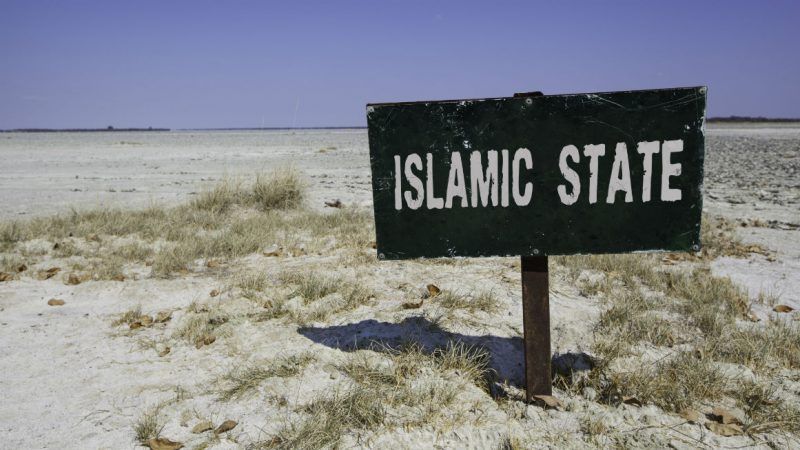The U.S. Shouldn't Play Endless Whac-A-Mole in Syria
ISIS' terror should not be minimized, but Washington should refrain from inflating it to justify unnecessary military action.

The Islamic State is continuing "its transition from a territory-holding force to an insurgency in Syria and solidif[ying] insurgent capabilities in Iraq," an August Defense Department report said. It is carrying out "assassinations, suicide attacks, abductions, and arson of crops" in both countries and establishing "resurgent cells" in Syria. As Joint Chiefs Chair Gen. Joseph Dunford told reporters last month, ISIS has lost its strongholds in Mosul, Raqqa, and beyond, but "there is still a fairly vibrant insurgency that has reverted to guerilla tactics, and so there is still a threat."
The crucial question for decision-makers in Washington is where that threat is aimed—and the answer is not the United States.
ISIS is a brutal agent of chaos, but it is ultimately a regional actor which cannot dream of posing a direct threat to America. Moreover, what danger ISIS can realistically advance against the U.S. exists regardless of the changes this report details: Launching terror attacks on Western soil does not require crop arson in Iraq or cells in Syria. That aspect of the threat is not to be minimized, but neither should it be inflated to justify costly, unnecessary, and ineffective military action.
These two facts—ISIS's regional limits and international flexibility—should guide Washington's response to this latest development, leading us away from reckless mission creep, which will risk much while accomplishing nothing for American security.
For the last two decades, the Washington establishment has pursued—unsuccessfully—counterinsurgency missions and open-ended occupations. It has played an endless game of Whac-A-Mole, cycling through patterns of surge and drawdown, "presence" and nation-building in aimless reaction to each new iteration of terror in the Mideast. That is exactly the mistake we must avoid in Syria.
Instead, the prudent course is to continue apace with the complete withdrawal of U.S. troops from Syria, which President Donald Trump announced late last year. Fortunately, Trump recently reiterated that exit is core to his Syria policy. "As [Secretary of State] Mike [Pompeo] said, we did a great job with the [Islamic State's territorial] caliphate," he said at a Cabinet meeting in mid-July. "We have 100 percent of the caliphate, and we're rapidly pulling out of Syria. We'll be out of there pretty soon," Trump continued. "And let them handle their own problems. Syria can handle their own problems—along with Iran, along with Russia, along with Iraq, along with Turkey. We're 7,000 miles away."
Though this promised withdrawal has been unduly delayed, Trump here is exactly right. There is no reason for the United States to jump to the front of the long line of those who want to fight ISIS.
The remains of ISIS are a regional concern which can and should be addressed by regional powers, including U.S. partners like Kurdish fighters and pro-democracy militias, as well as their enemies in Syria's civil war, the Bashar al-Assad regime and its allies, Russia and Iran. Neighboring states like Turkey and Iraq oppose ISIS too—it is universally beset by forces from all sides of the Middle East's Sunni-Shia-secular conflict—and that will not change when America leaves.
However, continued U.S. drawdown could incentivize our "Syrian militia partners to look for 'alternate partnerships and resources,'" the Pentagon's acting inspector general, Glenn Fine, wrote at the opening of this week's report. Fine cast this as a negative, but the opposite is true: ISIS is a problem to be managed by those directly affected. Local actors reclaiming responsibility for their own security is a shift to be encouraged, not avoided. And burden-sharing has been a consistent theme of this administration.
Insofar as it is possible to pitch into the underlying social and political problems that allow groups like ISIS to arise in the first place, regional players—armed with a cultural proximity and vested interest Washington can never replicate—stand the best chance of making progress. Prolonging American meddling will only get in their way. (That the reconstitution of ISIS documented in this report occurred despite American presence in Syria demonstrates the futility of ongoing U.S. intervention as a method of eradicating ISIS activity.)
Leaving behind U.S. troops in Syria long after their mission is complete puts them at needless risk, and it will do nothing to enhance Americans' security. If ISIS moves its focus to Al-Qaeda-style attacks in the U.S. and Europe, as it seemed to do in 2016 and 2017, permanent U.S. occupation of Syria will do nothing to stop it. The very nature of this sort of terror threat is that it can be planned and executed anywhere with relatively few resources. Holding territory does provide some benefit to America's enemies, but no caliphate is needed, and neither is the sort of insurgency ISIS maintains now.
That reality makes canceling or further delaying our exit from Syria a bad counterterror strategy. To keep U.S. boots on the ground in Syria is to endanger American lives and sap American taxpayers to no good end. It is an indefensible exercise in foreign policy inertia, always moving the goalpost to keep the United States at war forever. We cannot fall for this bluff again.
While it is standard in Washington to speak of U.S. intervention "destroying" ISIS, any sober analysis must recognize that we can and will do no such thing, even with perpetual war. We have effectively deprived the Islamic State of its territory, but it is not possible by military means to entirely stamp out ideology-fueled terrorism. This is a political problem, and it is not one we are equipped to solve. ISIS's resurgence in Syria is not evidence that our forever war is working; if anything, it proves the exact opposite—and it is one more reason to finally come home.
